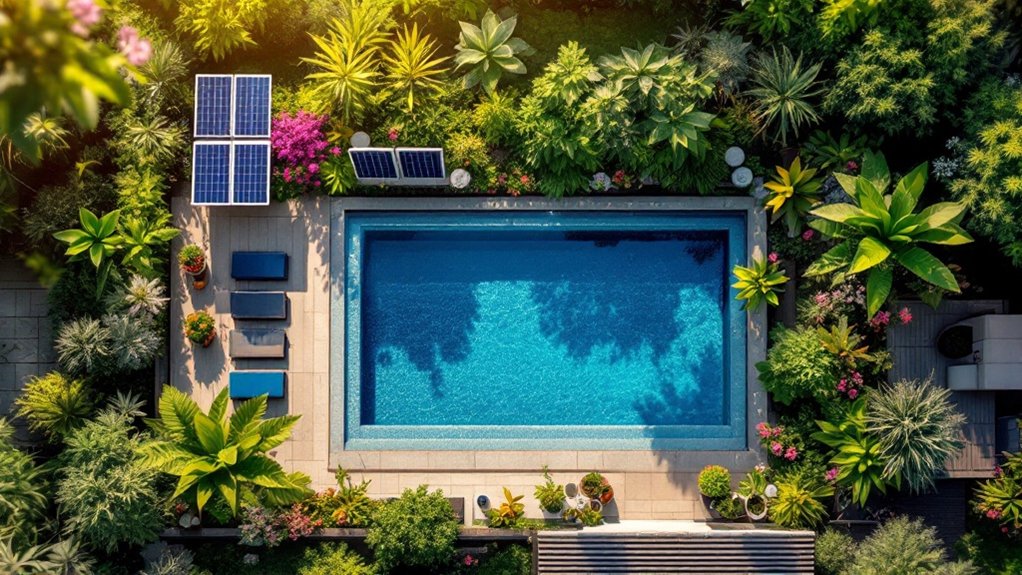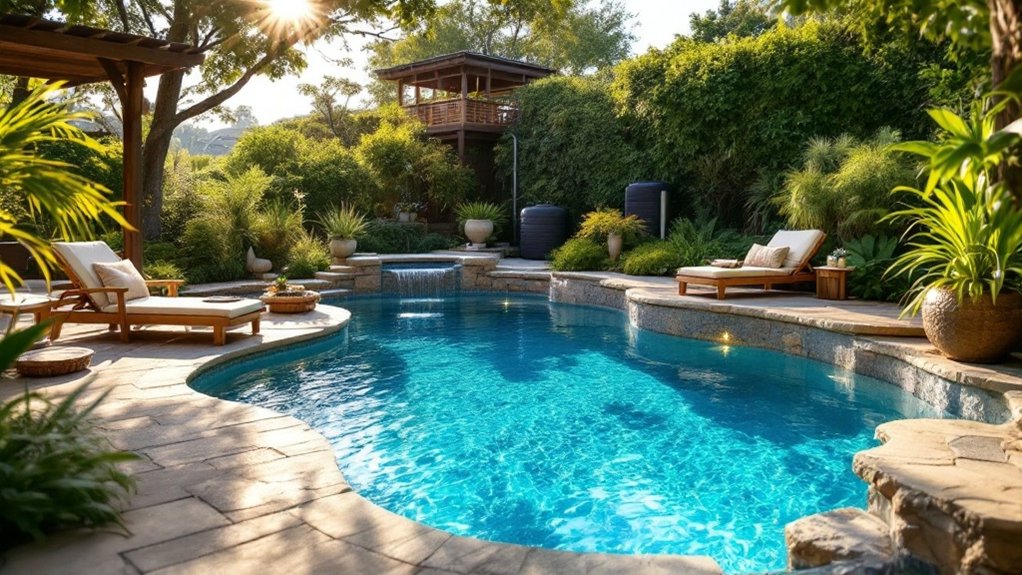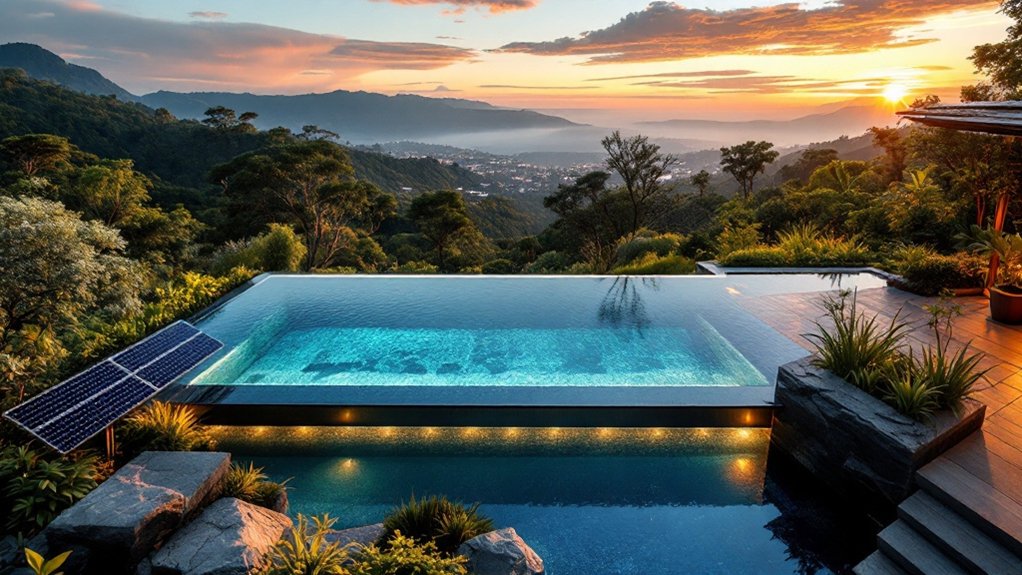Sustainable pool design is gaining traction as homeowners seek eco-friendly solutions. Solar energy stands out as a key player in this movement. It offers numerous benefits, from reducing reliance on fossil fuels to lowering operational costs. As innovations in solar technology emerge, they promise to enhance both efficiency and aesthetics. However, the implications of these advancements extend beyond mere functionality. What does this mean for the future of pool ownership?
The Importance of Sustainability in Pool Design
As the demand for environmentally responsible construction practices grows, the importance of sustainability in pool design becomes increasingly evident. Homeowners and builders are prioritizing eco-friendly materials and energy-efficient technologies that minimize environmental impact. Sustainable pool design focuses on water conservation, utilizing innovative filtration systems and eco-friendly chemicals to reduce chemical usage. Additionally, incorporating natural landscaping can enhance biodiversity while creating a serene environment. Energy-efficient pumps and LED lighting further decrease energy consumption, aligning with global sustainability goals. By embracing sustainable practices, pool designers can create aesthetically pleasing spaces that respect ecological integrity and reduce resource consumption. This shift not only promotes environmental stewardship but also appeals to consumers increasingly concerned about their ecological footprint.
Understanding Solar Energy and Its Benefits
Harnessing solar energy presents a significant opportunity for enhancing sustainable pool design. This renewable energy source offers numerous advantages, primarily its ability to reduce reliance on fossil fuels and lower overall energy costs. Solar energy is abundant and environmentally friendly, contributing to a reduction in greenhouse gas emissions. By integrating solar technology, pool owners can optimize energy efficiency, resulting in lower operational expenses and a smaller carbon footprint. Additionally, solar energy can extend the swimming season by providing consistent heating, improving user comfort without excessive energy consumption. As awareness of environmental issues grows, the incorporation of solar energy into pool design aligns with broader sustainability goals, promoting a responsible approach to leisure and recreation that benefits both owners and the planet.
Innovative Solar Pool Heating Solutions
While traditional solar pool heating systems have been effective, innovative solutions are now emerging that enhance efficiency and user experience. One such advancement is the integration of photovoltaic thermal (PVT) systems, which simultaneously generate electricity and heat water, thereby maximizing energy output. Another notable development is the use of solar blankets that incorporate advanced materials, improving heat retention and reducing evaporation. Additionally, automated control systems are being introduced, allowing users to optimize heating schedules based on real-time weather data, consequently conserving energy. Moreover, some companies are exploring solar pool heating systems that utilize nanotechnology to increase the absorption of sunlight, greatly boosting heating efficiency. These innovations collectively represent a considerable shift towards more sustainable and effective solar pool heating solutions.
Solar-Powered Pool Equipment and Accessories
In the domain of sustainable pool design, solar-powered equipment plays an essential role in enhancing energy efficiency. Solar pool heaters provide an eco-friendly solution for maintaining comfortable water temperatures, while energy-efficient pumps optimize circulation and reduce electricity consumption. Together, these innovations contribute to a greener approach to pool ownership.
Solar Pool Heaters
Solar pool heaters offer an efficient and eco-friendly solution for maintaining comfortable water temperatures in swimming pools. Utilizing solar energy, these systems convert sunlight into heat, which is then transferred to the pool water. Typically installed on rooftops or in open areas, solar panels collect solar radiation and can greatly reduce energy costs associated with traditional heating methods. With minimal operational expenses and low environmental impact, solar pool heaters are a sustainable choice for pool owners. Additionally, they can extend the swimming season, allowing for enjoyable swimming experiences even in cooler months. By harnessing renewable energy, solar pool heaters contribute to a greener lifestyle while effectively ensuring pools remain at pleasant temperatures year-round.
Energy-Efficient Pumps
Energy-efficient pumps are an essential component of sustainable pool design, complementing the benefits of solar pool heaters. These pumps utilize advanced technology to reduce energy consumption while maintaining peak water circulation and filtration. By operating at lower speeds, energy-efficient pumps minimize electricity usage and decrease noise levels, contributing to a more serene pool environment. Additionally, many models are compatible with solar power systems, allowing for a fully renewable energy solution. This integration not only lowers operational costs but also extends the lifespan of the equipment. As pool owners increasingly prioritize sustainability, energy-efficient pumps represent a crucial investment in reducing environmental impact while enhancing overall pool efficiency and enjoyment. Adopting these technologies aligns with broader goals of energy conservation and responsible resource management.
Real-World Examples of Solar-Integrated Pools
While many homeowners are increasingly prioritizing sustainability, the integration of solar technology into pool designs has emerged as a leading trend. Numerous real-world examples illustrate this shift. For instance, a family in California successfully installed solar panels that power their pool heating system, allowing them to enjoy warm water year-round without relying on fossil fuels. Another case in Florida showcases a resort that has integrated solar thermal systems to heat its multiple pools, greatly reducing energy consumption. Additionally, a residential project in Texas utilized solar cover mats that capture sunlight and heat the water naturally. These examples highlight the versatility and effectiveness of solar-integrated pools, demonstrating a commitment to eco-friendly practices while enhancing the swimming experience.
Cost Savings and Financial Incentives for Solar Pools
Solar pools offer significant long-term savings, reducing energy costs associated with traditional heating methods. Homeowners may also benefit from various tax credits and financial incentives designed to promote renewable energy adoption. These financial advantages make solar-integrated pools an appealing option for those looking to invest in sustainable design.
Long-term Savings Benefits
Investing in sustainable pool design not only enhances environmental responsibility but also yields significant long-term savings. Solar energy systems can dramatically reduce operational costs by minimizing reliance on traditional energy sources. Homeowners can experience substantial reductions in monthly electricity bills, as solar panels generate clean energy to power pool pumps, heaters, and lighting. Additionally, the longevity and durability of solar equipment often translate into lower maintenance and replacement costs over time. By harnessing solar energy, pool owners not only contribute to sustainability but also realize financial benefits that accumulate over the years. In a landscape of rising energy costs, these savings can be pivotal, making solar-equipped pools an economically sensible choice for the future.
Available Tax Credits
Numerous tax credits and financial incentives are available to homeowners who choose to install solar pool systems. These incentives often include federal tax credits, which can cover a considerable percentage of the installation costs, thereby reducing the overall financial burden. Additionally, many states offer their own tax credits and rebates, making solar pool systems more accessible. Local utility companies may also provide incentives, such as rebates for energy-efficient installations or net metering programs that allow homeowners to receive credits for excess energy produced. By taking advantage of these financial incentives, homeowners can considerably lower their upfront investment and improve the return on investment for their solar pool systems. These savings contribute to the growing appeal of sustainable pool design.
Designing an Aesthetically Pleasing Solar Pool Environment
While creating a solar pool environment, the emphasis on aesthetics can greatly enhance the outdoor experience. Thoughtful design elements, such as natural stone surrounds, elegant landscaping, and harmonious color schemes, contribute to a visually appealing space. Integrating solar panels creatively, perhaps by using sleek, low-profile designs, guarantees they blend seamlessly into the overall aesthetic rather than detracting from it. Additionally, incorporating features like decorative lighting, stylish pool furniture, and vibrant plant life can create an inviting atmosphere. The use of sustainable materials further elevates the space while promoting eco-friendliness. Ultimately, a well-designed solar pool area not only serves its functional purpose but also becomes a beautiful retreat, encouraging relaxation and enjoyment in a sustainable manner. Furthermore, a level ground pool can enhance safety and ease of maintenance, making it a practical choice for homeowners looking to create a serene outdoor haven.
Frequently Asked Questions
How Much Sunlight Is Needed for Solar Pool Systems to Be Effective?
The effectiveness of solar pool systems hinges on sunlight exposure, typically requiring at least six hours of direct sunlight daily. Adequate sunlight guarantees ideal heating and energy efficiency, maximizing the system’s performance and benefits.
Are There Specific Pool Types Better Suited for Solar Integration?
Certain pool types, such as inground pools with ample sunlight exposure and energy-efficient designs, demonstrate better suitability for solar integration. Their structural features and location facilitate ideal solar panel placement, enhancing energy absorption and efficiency.
What Maintenance Is Required for Solar Pool Equipment?
Maintenance for solar pool equipment typically includes regular inspection of panels, cleaning to remove debris, checking connections, and ensuring that the pump functions properly. Routine checks help maximize efficiency and extend the lifespan of the system.
Can Solar Pool Systems Work in Colder Climates?
Solar pool systems can indeed function in colder climates, although their efficiency may diminish. Proper insulation and strategic placement enhance performance, allowing for effective heating despite lower temperatures, enabling year-round enjoyment in various environments.
How Long Does It Take to Install Solar Pool Heating Systems?
The installation of solar pool heating systems typically takes one to three days, depending on the system’s complexity and the pool’s size. Professional installation guarantees ideal placement and integration with existing pool infrastructure for efficient heating.
Conclusion
Incorporating solar energy into pool design represents a pivotal shift towards sustainability in the industry. By leveraging innovative solar technologies, homeowners can enhance energy efficiency, reduce operational costs, and minimize their environmental impact. As the demand for eco-friendly solutions grows, integrating solar features not only elevates property value but also aligns with the desires of environmentally conscious consumers. Ultimately, solar energy is not just a trend; it is a crucial component of modern, sustainable pool design.




